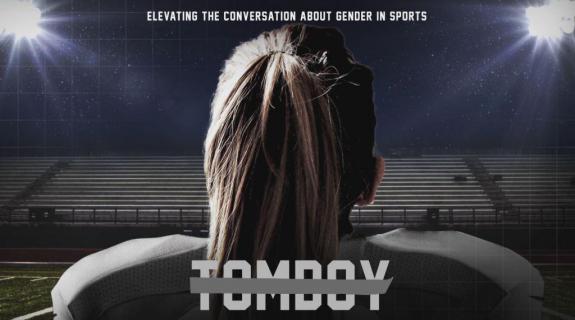“I guess sports just aren’t for you.”
It is a profoundly, heartbreakingly simple sentiment. And it’s way more likely to be told to someone with two X chromosomes.
NBC Sports Bay Area producer Sean Maddison heard a parent utter those words to a young girl who came off the soccer field crying. The two left. It happened shortly after Maddison’s son also came off the field upset—and was promptly sent back into the game.
No doubt the sports aren’t for you mantra has been heard by generations of girls. First it was an obvious, explicit, pre-Title IX statement of fact. Now it’s more of an implicit nudge. Where boys are taught from a young age to be tough, aggressive and fight their way back onto the field, girls who may face similar setbacks are often more quickly delivered the message that they might just be better suited doing something else.
If you think these stereotypes are dead, just Google Mike Francesa’s recent rant about women coaches or watch Jameis Winston’s cringeworthy approach to gender identity while speaking to young students at a school in Florida.
In any event, it was that simple moment on a kids’ soccer field that inspired Maddison to pursue a multi-platform project on NBC Sports Bay Area about women in sports. It became the basis for Tomboy, an hour-long documentary that’s been airing throughout Women’s History Month on each of NBC’s regional sports networks and will premiere on NBC Sports Network Thursday afternoon.
“Creatively, this was Sean’s baby,” says NBC Sports Bay Area Senior Executive Producer David Koppett. “He did almost all of the shooting, editing and producing of this show himself.”
The documentary features interviews with athletes ranging from world champion skier Lindsey Vonn to Little League World Series hero Mo’ne Davis as well as women like Afghanistan-born Nadia Nadim whose story may be less well known but is no less inspiring.
Nadim picked up soccer while playing in a refugee camp and now plays striker for the Portland Thorns in the National Women’s Soccer League.
Tomboy tells the stories of these women in their own words. It also delves into deeper issues related to girls’ participation in sports, noting that while huge progress has been made, three in five women still don’t participate, according to the Women’s Sports Foundation. Those numbers only increase further among minority and low-income populations.
“It was always important to us that the documentary content itself was going to be told only with women’s voices,” says Koppett. “The voices of female athletes are just heard tremendously less than the voices of male athletes.”
In the film, Women’s Sports Foundation Chief of Special Projects Deborah Slaner Larkin discusses how early gender bias begins.
“Gender bias quite frankly starts a couple minutes after birth,” Larkin says in the doc. “There are many studies that show that male babies are let to cry a little longer, learn how to be self-sufficient whereas the female babies are cuddled right away and picked up and ‘Oh, it’s Ok.’ So boys even at that age learn to be a little more independent.”
“That was a really important scene that I had not thought about before,” says Koppett. “I learned how early the differences start between boys and girls and the differences with how they are raised regarding sports.”
Even the name “tomboy” is a loaded term. Think back to when you were in school. It was used to connote a girl who liked sports, or riding dirt bikes or doing just about anything that wasn’t thought to be “girly.” And it usually wasn’t a term of endearment.
“I was told, ‘You should not play around with boys because that’s not what girls do,’” says Nadim in the film. “You can play soccer, do whatever you want to do, and still be feminine. It has nothing to do with gender.”
Starting at the beginning of the month, NBC Sports and NBCUniversal built out social media initiatives around Tomboy and developed additional programming components, like podcasts, through their regional sports networks.
At CSN New England, sports anchor Trenni Kusnierek participated in a symposium on women in sports, both as athletes and journalists. A refreshingly outspoken voice in the Boston market, Kusnierek says it could be her passion for women’s issues (“probably to [NBC’s] annoyance” she jokes) that led NBC to think of her for an assignment she’ll remember forever: a one-on-one interview with Billy Jean King. The half-hour special is running in tandem with the documentary.
“I was thrilled that they would pick me and thrilled that I would get to sit down with a legend,” says Kusnierek, who flew straight from Red Sox spring training to New York City to tape the interview.
Among a project filled with impressive women, King still stands out. Not only did she win 39 Grand Slam titles in her legendary tennis career, but she’s been a pioneering figure for women in sports and gender equality for close to four decades.
“I wasn’t born when Battle of the Sexes happened” says Kusnierek. “To see the old clips of her fighting for women’s equality back in the 1970s, it really hit home for me that there was someone who risked her own career and her own earning potential…[It] reminded me that as a woman, we’ve come so far but it was very difficult to get there.”
While Koppett freely admits Tomboy won’t garner the same interest as a Warriors game, it did earn a 1.7 household rating in the Bay Area when it debuted earlier this month. And it’s really not about how many people watch it, but whether it impacts those who do.
“Really we were trying to raise awareness and start a conversation and maybe make people look at it in a new way,” says Koppett. “If we reach people and enable them to talk about some of these issues in a way they hadn’t before, I think that’s the best marker of success.”
Tags:













































__twocolumncontent.jpg)











